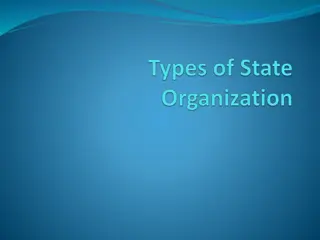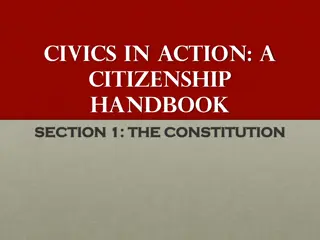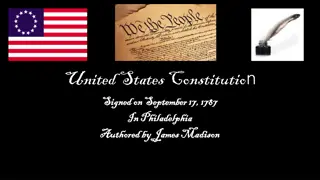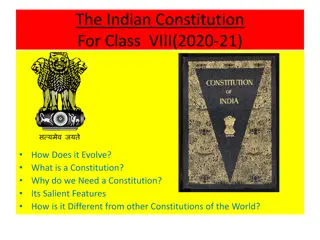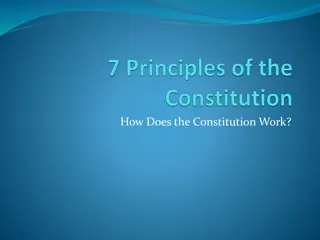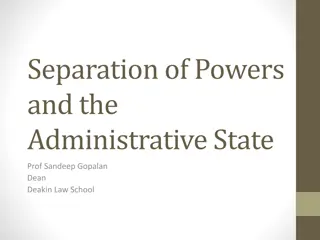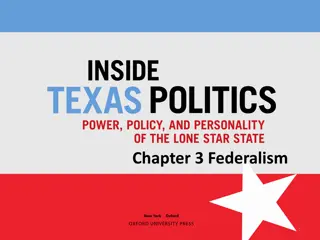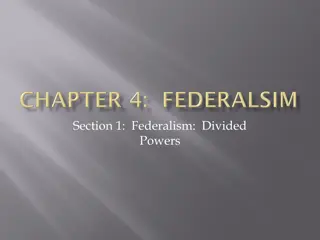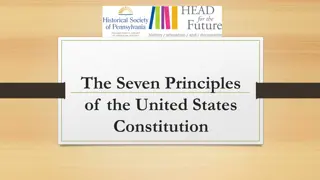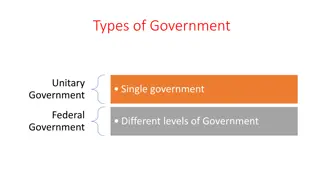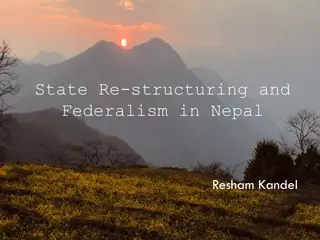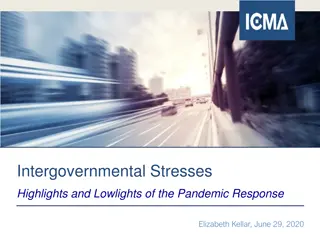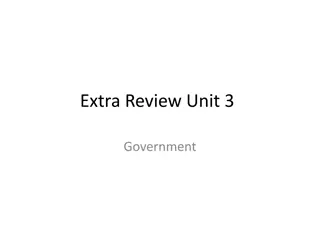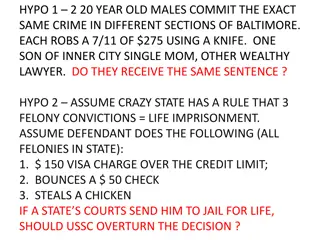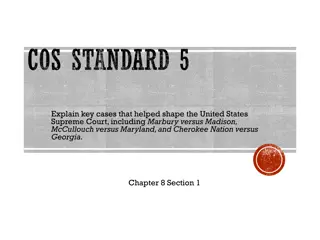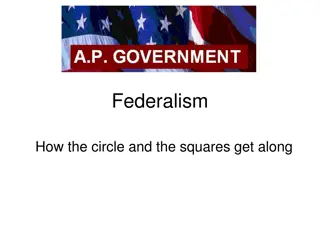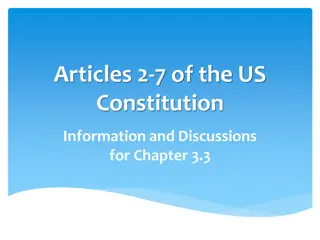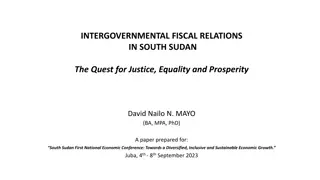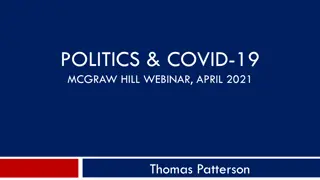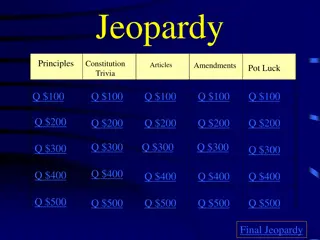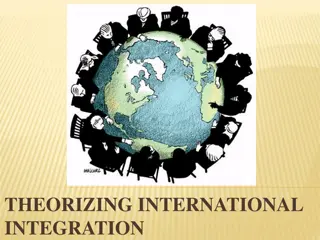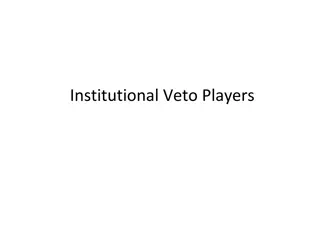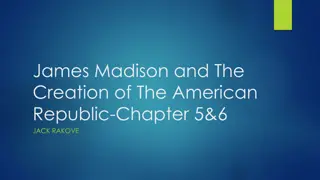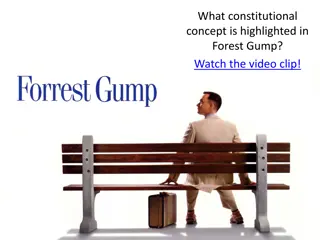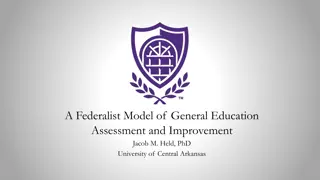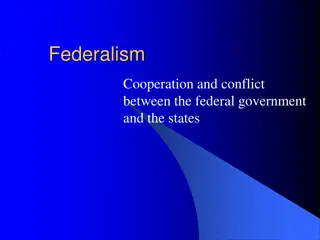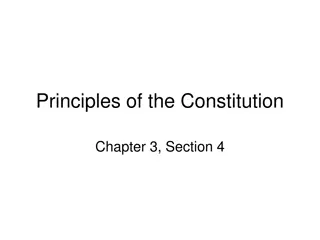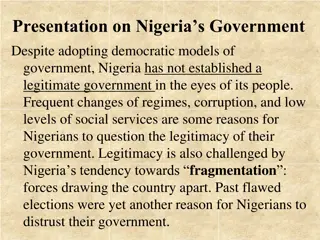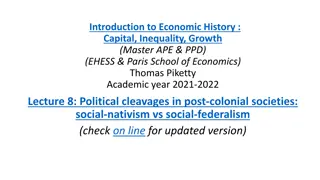Challenges of Constitutional Reform in Nigeria: A Comprehensive Analysis
Delve into the complexities of Nigeria's constitutional reform efforts since the Fourth Republic began in 1999. Explore the structural, institutional, and historical drivers of constitutional conflict, from a deeply divided society to issues of federalism and ethnic autonomy. Assess the challenges a
0 views • 35 slides
Overview of Unitary, Confederal, and Federal States
Unitary, confederal, and federal states each have distinct characteristics regarding the distribution of power between central and subnational governments. Unitary states have centralized governance, while devolved states like the UK grant autonomy to subnational entities. Decentralized states trans
0 views • 22 slides
Understanding the Foundation of US Government: The Constitution and its Principles
The Constitution of the United States outlines key principles governing the government, including popular sovereignty, republicanism, limited government, federalism, separation of powers, checks and balances, and individual rights. It establishes six goals for the US government and delineates the po
2 views • 12 slides
Understanding the United States Constitution and Federalism
Delve into the history and significance of the United States Constitution, authored by James Madison in 1787. Explore the debate of ratification, Federalist vs. Anti-Federalist arguments, and the concept of Federalism, with a focus on the balance of powers between the central and state governments.
1 views • 23 slides
Evolution and Key Aspects of the Indian Constitution
The Indian Constitution, evolving from principles of freedom struggle, serves as a set of rules defining citizen-government relations. It generates trust, limits power, and safeguards fundamental principles. Featuring federalism, it establishes governance at three levels: Centre, State, and Local, s
1 views • 15 slides
Understanding the Seven Principles of How the Constitution Works
Explore the seven principles of the Constitution through visual metaphors, learning about popular sovereignty, republicanism, federalism, separation of powers, and more. Enhance your understanding of how the Constitution functions in governing society.
0 views • 22 slides
Principles of Separation of Powers in the Administrative State
Understanding the principles of separation of powers - including the separation of functions, division of power, checks and balances, bicameralism, and federalism - is crucial in maintaining a system where governmental entities coexist harmoniously while preventing the concentration of political pow
0 views • 20 slides
Understanding Federalism in the United States
Explore the different types of governmental systems and the distribution of power between the federal and state governments. Learn about the advantages of federalism, how Texas utilizes federal funding, and the evolution of cooperation and coercion within the federal system over time. Dive into conf
7 views • 17 slides
Understanding Federalism: Divided Powers and Constitutional Framework
Federalism is a system where powers are divided between a central government and regional entities. It involves delegated, reserved, exclusive, and concurrent powers outlined in the Constitution. The supremacy of the Constitution is pivotal in establishing a unified federal government.
0 views • 5 slides
Federalism and Election Administration in 2022
Explore the intersection of federalism and election administration in the 2022 U.S. elections, focusing on challenges such as election denialism, security measures, and the roles of state and federal officials. Learn about the key concepts of election oversight, the impact of electoral processes at
0 views • 7 slides
The Seven Principles of the United States Constitution Explained
The United States Constitution is based on seven key principles: Popular Sovereignty, Republicanism, Limited Government, Federalism, Separation of Powers, Checks and Balances, and Individual Rights. These principles outline the foundation of the American government, emphasizing the importance of cit
0 views • 9 slides
Understanding Fiscal Federalism and Decentralization in Government Systems
Fiscal federalism involves the allocation of responsibilities and resources between central and local governments, addressing key issues such as regulation, incentives for resource transfer, and financial balance. Fiscal decentralization, on the other hand, focuses on transferring taxing and spendin
0 views • 16 slides
State Re-structuring and Federalism in Nepal by Resham Kandel
State restructuring in Nepal involves the redistribution of power across different tiers of government and the redesign of governance structures to achieve political, economic, social, and administrative transformation. The concept focuses on decentralization, inclusivity, and proportional represent
0 views • 26 slides
Understanding Federalism in the United States
Federalism in the United States involves the relationship between the federal government and state governments, with terms such as delegated powers, reserved powers, concurrent powers, and the Elastic Clause playing key roles. The aftermath of events like Hurricane Katrina and policies such as No Ch
0 views • 30 slides
Challenges and Impacts of the Pandemic on Intergovernmental Cooperation
The pandemic has led to severe economic repercussions for state and local governments, with significant revenue losses and job cuts. The CARES Act provided some relief, but issues like distribution challenges and documentation worries persist. The need for fiscal federalism is highlighted amid decli
3 views • 10 slides
Government Review Questions and Answers
Explore essential concepts in government through a series of questions and answers covering topics such as federalism, amendments, due process, influential philosophers, and historical events like the Massachusetts rebellion post-Revolutionary War.
0 views • 20 slides
Understanding Key Concepts in U.S. Law and Constitution
Explore various legal scenarios and foundational principles in the U.S. legal system, such as equality in sentencing, interpretation of the constitution, societal obligations, and the roles of different government branches. Dive into historical contexts, the Supreme Court's role in shaping legal pre
0 views • 273 slides
Landmark Supreme Court Cases: Marbury vs. Madison, McCullough vs. Maryland, Cherokee Nation vs. Georgia
Landmark Supreme Court cases, including Marbury vs. Madison, McCullough vs. Maryland, and Cherokee Nation vs. Georgia, played pivotal roles in shaping the authority and jurisdiction of the United States Supreme Court, particularly regarding issues of sovereignty, federalism, and native rights. These
0 views • 6 slides
The Nixon Administration: Politics and Economics in the 1960s
The Nixon Administration in the 1960s appealed to Middle America with promises of restoring order and appealing to conservative values. Nixon's Southern Strategy, focus on law and order, implementation of the New Federalism program, and attempts to reform welfare systems were key aspects of his pres
0 views • 13 slides
Understanding Federalism: Powers, Relationships, and Key Terms
Explore the concept of Federalism through the relationship between the federal government (circle) and state governments (squares). Discover the powers involved such as Delegated, Reserved, Concurrent, and Prohibited powers. Delve into significant cases like McCulloch v. Maryland, terms like the Ela
0 views • 28 slides
Exploring Articles II-VII of the US Constitution
Dive into the details of Articles II to VII of the US Constitution, covering the branches of government, federalism, the amendment process, the significance of the courts, and more. Explore key questions, discussions, and concepts related to the foundational document of the United States.
0 views • 8 slides
Intergovernmental Fiscal Relations in South Sudan: A Quest for Justice, Equality, and Prosperity
This paper explores intergovernmental fiscal relations in South Sudan, focusing on decentralization, taxation, spending, grants, equalization, and transfers to oil-producing states. It discusses the importance of fiscal federalism, the evolution of decentralization in Sudan, and the country's depend
0 views • 21 slides
Impact of COVID-19 on Politics, Public Health, and Economy: Insights and Analysis
The intersection of politics, public health, and economics during the COVID-19 pandemic is explored, highlighting the challenges faced by the United States and other nations. The failure to mitigate the public health crisis, coupled with the rapid economic shock, raises questions about the trade-off
0 views • 39 slides
American Government Principles and Constitution Trivia
Delve into the fundamental principles of American government, including popular sovereignty, republicanism, federalism, checks and balances, and limited government. Test your knowledge on the Constitution with questions about the number of amendments and the key concepts that shape the nation's gove
0 views • 53 slides
Theories of International Integration: From Neoliberalism to Structuralism
The concept of international integration has evolved over time, with classic theories like federalism and functionalism giving way to newer ideas like neoliberalism and structuralism. Neoliberalism emphasizes economic liberalization for improved competitiveness and living standards, while structural
0 views • 56 slides
Understanding Federalism and Devolution in Government Structures
Federalism encompasses the division of sovereignty between territorial levels, while devolution grants powers to subnational governments with the right to recall them. This approach is evident in countries like India. The structural components of federalism involve geopolitical division, independenc
0 views • 64 slides
Evolution of American Governance: From Articles of Confederation to Constitutional Convention
Explore the transition from the Articles of Confederation to the Constitutional Convention shaped by assumptions about government after the Revolution. Discover how James Madison identified problems with the Articles, leading to key issues like representation, federalism, executive responsibilities,
0 views • 11 slides
Understanding Federalism in the US Constitution
Forest Gump showcases the conflict between state and federal powers, exemplified by Governor George Wallace's refusal to desegregate the University of Alabama. The scenario underscores the concept of federalism, which isn't explicitly stated in the Constitution but is evident in the division of powe
0 views • 18 slides
A Federalist Model of General Education Assessment and Improvement
In this presentation, Dr. Jacob M. Held from the University of Central Arkansas introduces the concept of a Federalist model for assessing and improving general education. The key takeaways emphasize the importance of assessment processes for prompting improvement and fostering meaningful conversati
0 views • 34 slides
Understanding Federalism: Cooperation and Conflict Between Governments
Federalism entails the division and sharing of powers between national and state governments, aiming for cooperative problem-solving. James Madison highlighted the need for checks and balances to control government abuse. The Constitution delegates specific powers to the national government while al
0 views • 9 slides
Understanding Principles of the Constitution and Government Structure
Explore key concepts such as popular sovereignty, rule of law, separation of powers, checks and balances, federalism, and the amendment process. Delve into the functions of each branch of government, levels of government, and powers allocated at different levels. Gain insights into voting behavior a
0 views • 9 slides
Challenges of Governance in Nigeria: A Historical Perspective
Despite adopting democratic models, Nigeria faces challenges in establishing a legitimate government due to frequent regime changes, corruption, low social services, fragmentation tendencies, flawed elections, and praetorianism. The complex political structure, historical federal government evolutio
0 views • 17 slides
Political Cleavages in Post-Colonial Societies: Social-Nativism vs. Social-Federalism
This lecture explores the shifting political cleavages in post-colonial societies, focusing on the rise of social-nativism and social-federalism. It examines the reversal of the education cleavage in Western democracies, the emergence of social-nativism in post-communist Eastern Europe, and the chan
0 views • 30 slides

